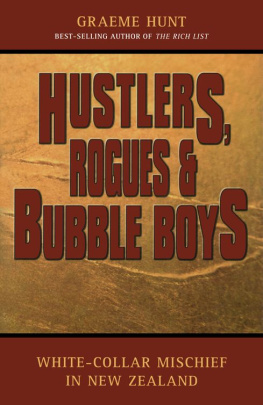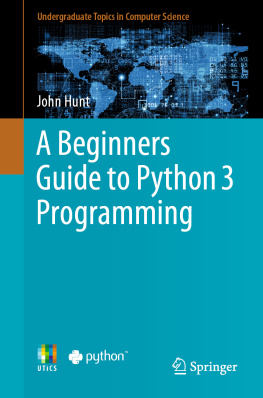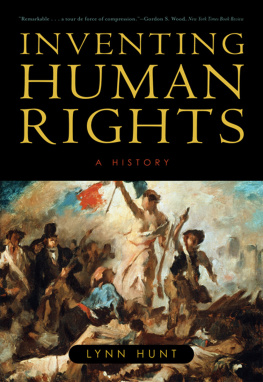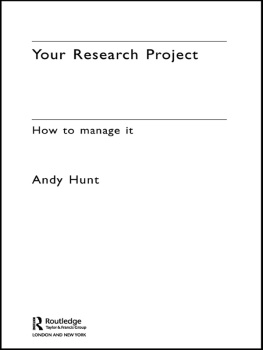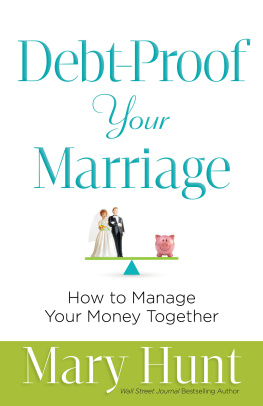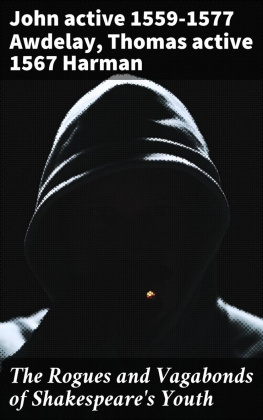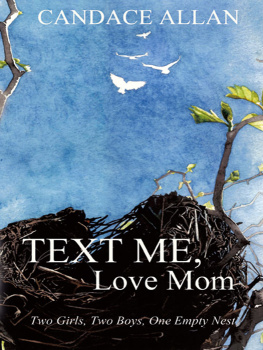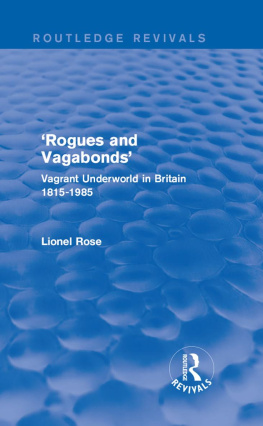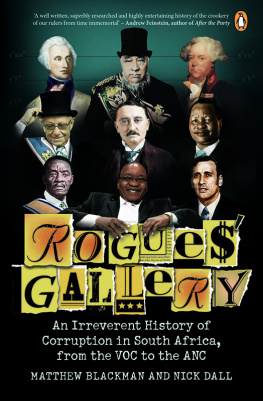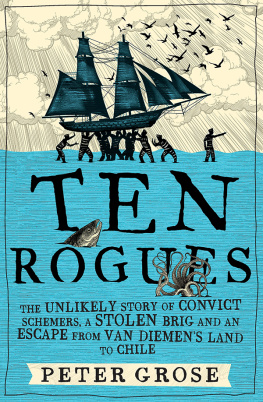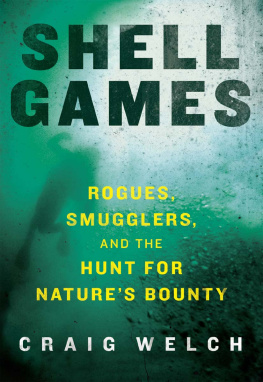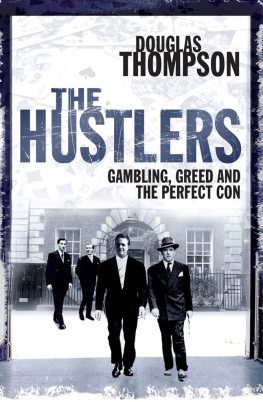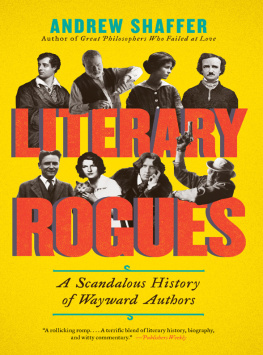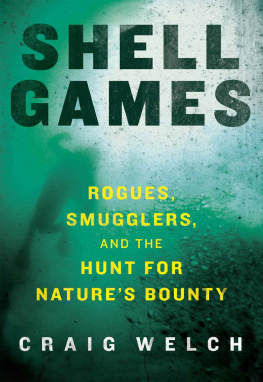White-collar crime is widely misconceived as a recent phenomenon created by a society whose values are dominated by commercial objectives and dedicated to greed. Critics cite the ideas of free-market economist Adam Smith, who first identified the wider social good of individuals pursuing their self-interest, as justification to regulate commerce and markets for the common good.
On this view, most forms of corporate chicanery are attributed to the inherent lack of ethics in business, big and small, with the basest motives ascribed to those involved. Public office, by contrast, is portrayed as a benign and socially responsible calling.
Graeme Hunts historical perspective reveals a different truth. Most crimes of dishonesty, deception and duplicity start with easy access to other peoples money and apart from gullible investors, that not infrequently means public coffers.
The early individuals in this litany of New Zealand rascals include those who led and helped create a highly successful colonial society. They have been included not because they were criminal as such, but rather because their speculative activities were essential to driving the forces of risk and return.
This is not to excuse bribery and corruption but to recognise their role in societies where trust is lacking or where normal markets do not exist. A powerful state, and a weak civil society, are usually the most conducive environments for such activities. While there is never room for complacency, it should be a matter of pride for all New Zealanders that the level of corruption and commercial crime here is low by world standards.
The role of cultural traits is now widely recognised as a reason why some societies become prosperous and others fail. Most successful societies include free markets, the right to property and an honest legal system. That should be remembered when reading this collection of colourful stories of characters who have succumbed to temptation but in most cases have been brought to account.
This book would not have been possible without the support of many people, not least my researcher, Kirsten Trainor Smith, who handled numerous and varied requests promptly and courteously throughout. David Verran, history librarian at the Auckland Central Librarys research centre, was similarly helpful as was Ian Stuart, Auckland bureau chief of the New Zealand Press Association.
Others who assisted with information, advice and/or practical help (in alphabetical order) include: Jock Anderson, Jeremy Ashford, Andrew Ayling, Ron Bailey, Grant Cameron, Mandy Clark, Brian Corban, Alan Coull, Rob Fenwick, Anne Gibson, Nevil Gibson, Warren Head, Jim Horrocks, Beverley Hunt, Chris Hutching, Deborah LaHatte, Don McDonald, John McKay, Naomi Mahon, Stephen Mills, Paul Moon, Alan Murray, Brian Nicolle, Simon Owen, Mary Pahi, David Peach, Lisa Prouting, Dick Scott, Victor Soh, Jane Thomson, Martin Thomson, Yvonne van Dongen, Gillian Vine and Chad Wilkie.
The following libraries and registries provided valuable information: Alexander Turnbull Library, Wellington; Archives New Zealand, Auckland regional office; Auckand Central Library, general, research centre and special collections; Auckland Institute and Museum; Births, Deaths and Marriages, Auckland office and Registrar-Generals office, Lower Hutt; Canterbury Museum, Christchurch; Canterbury Public Library, Christchurch; Coroners Office, Department for Courts, Auckland; General Register Office, London, England; Hocken Library, Dunedin; Mitchell Library, Sydney, Australia; New South Wales Registry of Births, Deaths and Marriages, Sydney, Australia; New Zealand Police, Hastings; Office of the Registrar-General, Toronto, Canada; Otago Settlers Museum, Dunedin; Timaru District Library; and Vital Statistics Agency, Winnipeg, Canada.
Finally, I owe special thanks to the Reed Publishing team, led ably by senior editor Peter Dowling, whose high editorial and production values made this a first-class publication.
Sources
Hustlers,Rogues&BubbleBoys is based on a variety of sources. Secondary sources (books, newspaper reports and the like) were my first port of call, but in many cases I have gone back to primary sources, such as court judgments, court records, and birth, marriage and death certificates. This is particularly the case where there have been gaps in the research or doubts about the accuracy of information. Where possible, I have tried to verify information from at least two independent sources. The NationalBusinessReview (NBR) has been generous in allowing me to reproduce pictures from its photographic files, and granting access to its newspaper and personality archives.
Names
Throughout the text I have generally referred to individuals by their commonly used first name where appropriate, unless the person tends to be known by more than one first name (such as John Logan Campbell) or it is unclear which first name is favoured. In this case I have used the full name on the first mention. In some instances a nickname has been used in preference to the first name because it is better known. Where a person is titled the honorific has been used. This is placed in parentheses for example, (Sir) when the honour had not been awarded at the time referred to. Full names are contained in the index and in the stand-alone profiles in each chapter.
Currencies
I have quoted New Zealand pounds () until metrication was introduced in 1967, thereafter dollars ($) are used. Pound and dollar amounts are New Zealand currency unless otherwise specified.
G RAEME J OHN H UNT
A UCKLAND
O CTOBER 2001
In 1966, AnEncyclopaediaofNewZealand noted that riots, organised crime and rackets were absent from New Zealand, armed robbery rare, the murder rate low, and bribery and corruption not problems. There was no mention of dishonesty offences.
Thirty-five years later the picture is different. Riots are rare but violent crime is on the rise, although not to the extent radio talkback hosts and some politicians would have us believe. And since the 1970s at least, the public has been made aware of the emergence of two new classes of offending white-collar and corporate crime.
There is no doubt there has been an increase in the number of professional people mostly gentlemen misappropriating or stealing clients money. But the extent to which this represents an outbreak of white-collar and/or corporate crime is highly debatable. While there were scapegoats aplenty after the spectacular company failures that followed the 1987 sharemarket crash, few of those deemed responsible were charged with serious offences, let alone convicted. Many failed property developers of that bleak period are back in business, embarrassed but not destroyed by their experience in the 1980s, and a few former executives of collapsed investment companies have returned to the business world. What has changed in the past 35 years is peoples attitude toward big business.
Big business has never been held in especially high regard in New Zealand. During the long period when farming generated the bulk of New Zealands export receipts, business was not infrequently portrayed as a refuge for profiteers and economic manipulators. Much of the early propaganda from the Labour Party, like that of its predecessor, the Liberal Party, focused on the alleged abuse from, and failings of, the capitalist class and how such abuse could be ameliorated by the intervention of the state.

